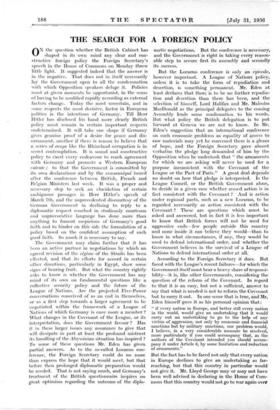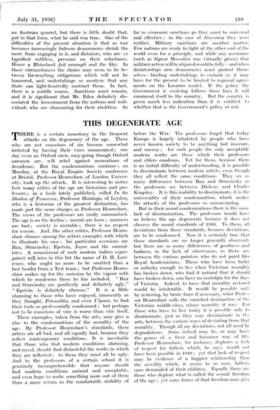THE SEARCH FOR A FOREIGN POLICY O N the question whether
the British Cabinet _has shaped in its own mind any clear and con- structive foreign policy the Foreign Secretary's speech in the House of Commons on Monday threw little light. It suggested indeed that the answer is in the negative. That does not in itself necessarily lay the Government open to all the condemnation with which Opposition speakers deluge it. Policies must at given moments be opportunist, in the sense of having to be modified rapidly according as external factors change. Today the most uncertain, and in sonic respects the most deciSive, factor in EurOpean politics is the intentions of Germany. Till Herr Hitler has disclosed his hand more clearly British policy must remain in certain • important respectS undetermined. It will take one shape if Germany gives genuine proof of a desire for peace and dis- armament, another if there is reason to believe that a series of coups like the Rhineland occupation is in secret contemplation. It is sound and constructive policy to exert every endeavour to reach agreement with Germany and promote a Western European entente ; to that the Government is committed by its own declarations. and by the communique issued after the conference between British, French and Belgian Ministers last week. It was a proper and necessary step to seek an elucidation of certain ambiguous passages in Herr Hitler's speech of March 7th, and the unprecedented discourtesy of the German Government in declining to reply to a diplomatic request couched in studiously courteous and unprovocative language has done more than anything to foment suspicions of Germany's good faith and to hinder on this side the formulation of a policy based on the confident assumption of such good faith. So much it is necessary to say.
The Government may claim further that it has been an active partner in negotiations by which an agreed revision of the regime of the Straits has been effected, and that its efforts for accord in certain other directions, particularly in Egypt, show some signs of bearing fruit. But what the country rightly asks to know is whether the Government has any mind of its own on fundamental questions like a collective security policy and the future of the League of Nations. Are the projected Five-Power conversations conceived of as an end in themselves, or as a first step towards a larger agreement to be negotiated within the framework of a League of Nations of which Germany is once more a member ?, What changes in the Covenant of the League, or its interpretation, does the Government favour ? Has it in these larger issues any assurance to give that will dissipate in part at least the profound mistrust its handling of the Abyssinian situation has inspired ? To some of these questions Mr. Eden has given partial answers. As to the so-called Locarno con- ference, the Foreign Secretary could do no more than express the hope that it would meet, but that before then prolonged diplomatic preparation would be needed. That is not saying much, and Germany's treatment of the British questionnaire inspires no great optimism regarding the outcome of the diplo- , • matic negotiations. But the conference is necessary, and the GovernMent is right in taking every reason- able "step to secure first its assembly and secondly its success.
But the Lbearno conference is only an _episode, however iniportant. A League of Nations policy, unless it is to take the form of repudiation and desertion, is something permanent. Mr. Eden at least declares that there is to be no further repudia7 tion and desertion than there has been, and the selection of himself, Lord Halifax and Mr. Malcolm MacDonald as the principal delegates to the coming Assembly lends some confirmation to his words. But what policy the British delegation is to put forward at Geneva we are not to know. In Mr. Eden's suggestion that an international conference on such economic problems as 'equality of 'access to raw materials may yet be convened there is a gleam of hope, and the Foreign Secretary gave almost verbatim the pledge long demanded of him by the Opposition when he undertook that " the armaments for which we are asking will never be used for a purpose inconsistent With the Covenant Of the League or the Pact of Paris." A great deal depends no doubt on how that pledge is interpreted. Is the League Council, or the British Government alone, to decide in a given case whether armed action is in fact consistent with the Covenant ? And is action under regional pacts, such as a new Locarno, to be regarded necessarily as action consistent with the Covenant ? These are questions which must be asked and answered, but in fact it is less important to know that British forces will not be used for aggressive ends—few people outside this country and none inside it can believe they would—than to know in what circumstances, if any, they would be used to defend international order, and whether the Government believes in the survival of a League of Nations to defend international order at all.
According to the Foreign Secretary it does. But faced with the League's recent failures—for which the Government itself must bear a heavy share ofresponsi- bility—it is, like other Governments, considering the question of the reform of the Covenant. In regard to that it is an easy, but not a sufficient, answer to say that what is needed is not to reform the Covenant but to carry it out. In one sense that is true, and Mr.: Eden himself gave it as his personal opinion that : "if every nation in Europe, and better still every nation in the world, would give an undertaking that it would carry out an undertaking to go to the help of any victim of aggression, not only by economic and financial sanctions but by military sanctions, our problem would, I believe, in .a very considerable measure be resolved, more particularly if you could accompany that, as the authors of the Covenant intended you should accom-' pany it under Article 8, by some limitation and reductiori of armaments."
But the fact has to be faced not only that every nation' in Europe declines to give an undertaking so far- reaching, but that thiS country in particular would not give it. Mr. Lloyd George may or may not have been well advised in declaring in the House of Com- mons that this country would not go to war again over an Austrian quarrel, but there is little doubt that, put in that form, what he said was true.. One, of the difficulties of the present situation is that as war becomes increasingly hideous democracies shrink the more from engaging in it, and dictators, who are ex hypothesi ruthless, presume on their reluctance. Hence a Rhineland fait accompli and the like. In those circumstances the choice may seem to lie be- tween far-reaching obligations which will not be honoured, and undertakings so anodyne that any State can light-heartedly contract them. In fact, there is a middle course. Sanctions must remain, and it is significant that Mr. Eden definitely dis- sociated the Government from the nations and indi- viduals who are clamouring for their abolition. So far as economic sanctions go they must be universal anal, effective ; in the • case of Abyssinia they were neither. Military sanctions are another matter. Few nations are ready to fight at the other end of the world even for a principle, and while any assurance (such as Signor Mussolini was virtually given) that military action will be abjured would be folly—and when dictatorships arm democracies must protect them- selves—binding undertakings to embark on it may have for the present to be limited to regional agree- ments on the Locarno model. If the policy the Government is evolving follows those lines it will commend itself to the country. But the country is given much less indication than it is entitled to whether that is the Government's policy or not.







































 Previous page
Previous page